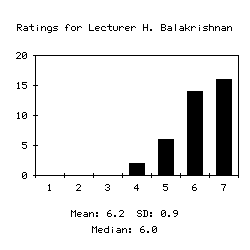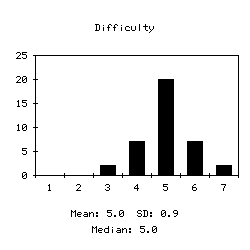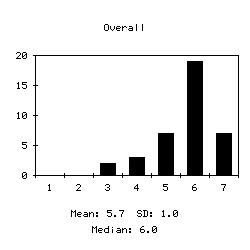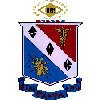6.829 Computer Networks (H)
(4.5
10.4
8.1)
Lecturer: : H. Balakrishnan
Lecturer's Rating: 6.2/7.0
Prerequisites: Programming experience, time, 6.033, interest in networking
|
Response rate: 39 out of 60
Difficulty: 5.0/7.0
Overall Rating: 5.7/7.0
Term Evaluated: Fall 2005
|



Lecturer's Comments:
This subject covers computer networks. This
class satisfies the doctoral qualifier for Course VI PhD students in
systems. However, most students take this class out of interest. Anyone
who wants to know how large-scale computer networks like the internet
really work should take this course. Undergraduate computer systems and
elementary probability and statistics are prerequisites for this
course.
This course covered a broad range of state of the art computer network
topics. Students learned about overlays, protocols, router design,
wireless networks,resource management, routing, BGP, and other
networking topics. Though the main source of reading was academic
papers, several students thought there was a good balance between
theory and application. If you want a class that teaches you about how
large-scale networks work, this class will meet your expectations and
you will probably enjoy it.
|
WHAT'S HOT
- Professor Balakrishnan
- Lectures
- Final project
- Learning state of the art computer networking
|
WHAT'S NOT
- Problem set three
- Too much work
- Final project
|
The majority of students took this course because of
their interest in networking. Since this course was a Grad-H course,
there were some students who needed it to satisfy the doctoral
qualifier or MEng requirements. Also, several others needed to take
this course to help them with their networking related theses.
Lecturer H. Balakrishnan
(6.2/7.0, 38 responses) received mostly positive reviews. Students
thought he was a great lecturer, even one of the best lecturers they
have had at MIT. Many students thought that Prof. Balakrishnan was a
very engaging lecturer. He was a clear presenter and explained concepts
very well. Also, he was very knowledgeable and intelligent.
TA J. Stribling
(4.9/7.0, 34 responses) received mixed reviews. Some students thought
that he was a good TA, useful, and good at explaining concepts.
However, several other students felt that he was very boring,
monotonous, and did not have mastery of the material, which made it
difficult for him to explain concepts well.
TA M. Vutukuru
(4.8/7.0, 32 responses) led recitations well. She was knowledgeable and
organized, but she spoke too softly and students stated that she was
difficult to understand. Some students thought that she did not explain
concepts well.
There were three problem sets in this course. Most students thought
that the first two were useful and of reasonable length, but thought
that the third was uselessly long and tedious. Students stated that the
third problem set required numerous graphs, coding, and in all was a
mess. The average time spent on problem sets was 14.1 hours, with the
third taking far longer. Almost all the students collaborated and found
it useful. Also, none of the students used a bible, since the material
changes from year to year.
The final project is worth a large portion of the final grade, 40%. The
project is open-ended, so starting early in finding an interesting
research project is important. Since students chose topics they were
interested in or that were related to their theses, many students found
the final project to be useful. Research experience and a strong
background in CS are advantageous.
This course did not use a textbook. The main sources of reference were
lecture notes and assigned academic papers. Most students thought that
the lecture notes were very well written, especially for the first half
of the term. However, as more emphasis was given to the academic
papers, some students felt that the quality of the lecture notes
deteriorated and they became less complete. Some students thought that
the research papers were useful, but others thought that they were long
and difficult.
The reviews of the exams were mixed: some students thought that the
exams were fair and fun, while others thought that they were long,
difficult, and tricky. Students stated that the first exam tested
detailed knowledge, especially from lectures, but the second exam
tested main ideas from the research papers. The course grades were
based on two quizzes (30%), problem sets (25%), final project (40%),
and participation (5%).
Several students suggested that the professor should make the lecture
notes available online much sooner.
Students are advised to begin thinking about their final project topic
early in the term. Some students suggested that a thorough
understanding of the research papers will help students do well on the
exams.
"Starbucks coffee next to classroom (32G-132)"
"Not enough psets (I know it's blasphemy!)"
"[Prof. Balakrishan] is one of the great lecturers at MIT."
"I love him (Hari Balakrishnan)."
Dated: April 30, 2006
Eta Kappa Nu, MIT












